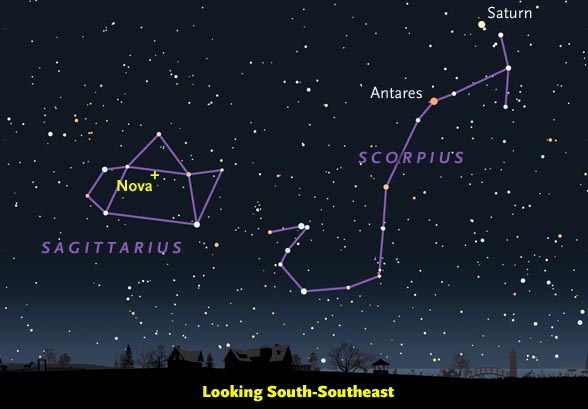Nova in Sagittarius Brightens!
by Alan MacRobert March 19, 2015
A 6th-magnitude nova erupted inside the Sagittarius Teapot on March 15th. It's in easy range of binoculars just before dawn — and still brightening. Link to S&T Article
Update Thursday March 19: The Nova has brightened to about magnitude 5.2, more than a half magnitude brighter than it was at it's discovery. There's no telling when it will stop.

The nova is right on the midline of the Sagittarius Teapot. The horizon here is drawn for the beginning of astronomical twilight in mid-March for a viewer near 40° north latitude. The nova is about 15° above this horizon. Stars are plotted to magnitude 6.5. For a more detailed chart with comparison-star magnitudes, see the bottom of this page.
You never know. On Tuesday, March 15th, nova hunter John Seach of Chatsworth, NSW, Australia, found a new 6th magnitude star shining in three search images taken by his DSLR patrol camera. The time of the photos was March 15.634 UT. One night earlier, the camera recorded nothing there to a limiting magnitude of 10.5.

Before and after. Adriano Valvasori imaged the nova at March 16.71, using the iTelescope robotic telescope “T9” — a 0.32-m (12.5-inch) reflector in Australia. His shot is blinked here with a similarly deep earlier image. One of the tiny dots at the right spot might be the progenitor star. The frames are 1⁄3° wide.
The Spectrum taken a day after the discovery confirmed that this is a bright classical nova ~ a white dwarf whose thin surface layer underwent a hydrogen-fusion explosion ~ of the type rich in ionized iron. The spectrum showed emission lines from debris expanding at about 2,800 km pr second,
The nova has been named Nova Sagittarii 2015 No. 2, after receiving the preliminary designation PNV J18365700-2855420. Here's it's up-to-date preliminary light curve from the American Association of Variable Star Observers (AAVSO). Here is the AAVSO's list of recent observations.
Although the nova is fairly far south (at declination -28° 55' 40", right ascension 18h 36m 56.8s), and although Sagittarius only recently emerged from the glow of sunrise, it's still a good 15° above the horizon just before the beginning of dawn for observers near 40° north latitude (i.e. New Jersey ~ Keith). If you are south of there it'll be higher, if you're north it'll be lower.
Binoculars are all you'll need.
To find when morning astronomical twilight begins at your location, you can use our (S&T's ~ Keith) online almanac. (If you're on daylight time like most of North America, be sure to check the daylight-Saving Time box).
Below is a comparison-star chart from AAVSO. Star's visual magnitudes are given to the nearest tenth with the decimal points omitted.
Check back here (S&T ~ Keith) for further updates!

Okay, great!
Let's try to get some imaging of the new nova....
Keith Marley

Before and after. Adriano Valvasori imaged the nova at March 16.71, using the iTelescope robotic telescope “T9” — a 0.32-m (12.5-inch) reflector in Australia. His shot is blinked here with a similarly deep earlier image. One of the tiny dots at the right spot might be the progenitor star. The frames are 1⁄3° wide.
The Spectrum taken a day after the discovery confirmed that this is a bright classical nova ~ a white dwarf whose thin surface layer underwent a hydrogen-fusion explosion ~ of the type rich in ionized iron. The spectrum showed emission lines from debris expanding at about 2,800 km pr second,
The nova has been named Nova Sagittarii 2015 No. 2, after receiving the preliminary designation PNV J18365700-2855420. Here's it's up-to-date preliminary light curve from the American Association of Variable Star Observers (AAVSO). Here is the AAVSO's list of recent observations.
Although the nova is fairly far south (at declination -28° 55' 40", right ascension 18h 36m 56.8s), and although Sagittarius only recently emerged from the glow of sunrise, it's still a good 15° above the horizon just before the beginning of dawn for observers near 40° north latitude (i.e. New Jersey ~ Keith). If you are south of there it'll be higher, if you're north it'll be lower.
Binoculars are all you'll need.
To find when morning astronomical twilight begins at your location, you can use our (S&T's ~ Keith) online almanac. (If you're on daylight time like most of North America, be sure to check the daylight-Saving Time box).
Below is a comparison-star chart from AAVSO. Star's visual magnitudes are given to the nearest tenth with the decimal points omitted.
Check back here (S&T ~ Keith) for further updates!

Okay, great!
Let's try to get some imaging of the new nova....
Keith Marley
No comments:
Post a Comment